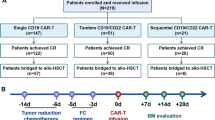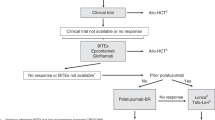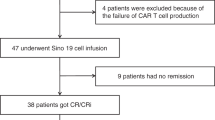Abstract
Treatment of acute lymphoblastic leukemia (ALL) is still a challenge despite years of researching, especially for those of poor prognosis. Zhang and his team recently proved that FLT3 gene mutation was identified in ~5% of ALL and the mutation spectrum is different from AML. Recently, chimeric antigen receptor T cells (CART) therapy presents great efficacy in treating refractory leukemia. We report a case of a refractory ALL patient with FLT3-ITD mutations and unfavorable karyotypes, who failed to respond to chemotherapy and small molecule tyrosine kinase inhibitors, successfully treated by CART therapy. FLT3-ITD mutations were downregulated dramatically into 14.1% positive 3 days after the infusion and remained negative until now. MRD has stayed to be negative from the 10th day. This case suggests that CART-cell therapy might be effective in treating FLT3-ITD positive refractory ALL, implying the possibility to overcome the traditional prognosis scoring system for leukemia and providing a new chance for other leukemia patients with inferior prognosis factors.
This is a preview of subscription content, access via your institution
Access options
Subscribe to this journal
Receive 12 print issues and online access
$259.00 per year
only $21.58 per issue
Buy this article
- Purchase on Springer Link
- Instant access to full article PDF
Prices may be subject to local taxes which are calculated during checkout


Similar content being viewed by others
References
Park JH, Riviere I, Gonen M, Wang X, Senechal B, Curran KJ, et al. Long-term follow-up of CD19 CAR therapy in acute lymphoblastic leukemia. N Engl J Med. 2018;378:449–59.
Hu Y, Sun J, Wu Z, Yu J, Cui Q, Pu C, et al. Predominant cerebral cytokine release syndrome in CD19-directed chimeric antigen receptor-modified T cell therapy. J Hematol Oncol. 2016;9:70.
Small D. FLT3 mutations: biology and treatment. Hematology. 2006;2006:178–84.
Gilliland DG, Griffin JD. The roles of FLT3 in hematopoiesis and leukemia. Blood 2002;100:1532–42.
Jinghui Z, Li D, Linda H, Gang W, Heatley SL, Debbie PT, et al. The genetic basis of early T-cell precursor acute lymphoblastic leukaemia. Nature. 2012;481:157–63.
Yamamoto T, Isomura M, Xu Y, Liang J, Yagasaki H, Kamachi Y, et al. PTPN11, RAS and FLT3 mutations in childhood acute lymphoblastic leukemia. Leuk Res. 2006;30:1085–9.
Xu F, Taki T, Yang HW, Hanada R, Hongo T, Ohnishi H, et al. Tandem duplication of the FLT3 gene is found in acute lymphoblastic leukaemia as well as acute myeloid leukaemia but not in myelodysplastic syndrome or juvenile chronic myelogenous leukaemia in children. Br J Hematol. 2015;105:155–62.
Stirewalt DL, Radich JP. The role of FLT3 in haematopoietic malignancies. Nat Rev Cancer. 2003;3:650–65.
Zhang Y, Zhang Y, Wang F, Wang M, Liu H, Chen X, et al. The mutational spectrum of FLT3 gene in acute lymphoblastic leukemia is different from acute myeloid leukemia. Cancer Gene Ther. 2019:1–8.
Armstrong SA, Mabon ME, Silverman LB, Li A, Gribben JG, Fox EA, et al. FLT3 mutations in childhood acute lymphoblastic leukemia. Blood 2004;103:3544–6.
Paietta E, Ferrando AA, Neuberg D, Bennett JM, Racevskis J, Lazarus H, et al. Activating FLT3 mutations in CD117/KIT(+) T-cell acute lymphoblastic leukemias. Blood 2004;104:558–60.
Stam RW, Schneider P, de Lorenzo P, Valsecchi MG, den Boer ML, Pieters R. Prognostic significance of high-level FLT3 expression in MLL-rearranged infant acute lymphoblastic leukemia. Blood, Am J. Soc Hematol. 2007;110:2774–5.
Ghaleb E, Mohammed A, Omar A, Kamal F, Omer AS, Mohammad AS, et al. FLT3 internal tandem duplication and D835 mutations in patients with acute lymphoblastic leukemia and its clinical significance. Mediterr J Hematol Infect Dis. 2014;6:e2014038.
Alkhayat N, Elborai Y, Al SO, Al SM, Alsuhaibani O, Awad M, et al. Cytogenetic profile and FLT3 gene mutations of childhood acute lymphoblastic leukemia. Clin Med Insights: Oncol. 2017;11:1–6.
Kenderian SS, Porter DL, Gill S. Chimeric antigen receptor T cells and hematopoietic cell transplantation: how not to put the CART before the horse. Biol Blood Marrow Transplant. 2017;23:235–46.
Paulsson K, Horvat A, Strombeck B, Nilsson F, Heldrup J, Behrendtz M, et al. Mutations of FLT3, NRAS, KRAS, and PTPN11 are frequent and possibly mutually exclusive in high hyperdiploid childhood acute lymphoblastic leukemia. Genes Chromosomes Cancer. 2008;47:26–33.
Peng HL, Zhang GS, Gong FJ, Shen JK, Zhang Y, Xu YX, et al. Fms-like tyrosine kinase (FLT) 3 and FLT3 internal tandem duplication in different types of adult leukemia: analysis of 147 patients. Croat Med J. 2008;49:650–69.
Wellmann S, Moderegger E, Zelmer A, Bettkober M, Von Stackelberg A, Henze G, et al. FLT3 mutations in childhood acute lymphoblastic leukemia at first relapse. Leukemia. 2005;19:467–8.
Nakao M, Janssen JW, Erz D, Seriu T, Bartram CR. Tandem duplication of the FLT3 gene in acute lymphoblastic leukemia: a marker for the monitoring of minimal residual disease. Leukemia. 2000;14:522.
Andersson A, Paulsson K, Lilljebjorn H, Lassen C, Strombeck B, Heldrup J, et al. FLT3 mutations in a 10 year consecutive series of 177 childhood acute leukemias and their impact on global gene expression patterns. Genes Chromosomes Cancer. 2008;47:64–70.
Xu B, Lin L, Tang JH, Zhou SY. Detection of FLT3 gene and FLT3/ITD mutation by polymerase chain reaction-single-strand conformation polymorphismin in patients with acute lymphoblastic leukemia. Di Yi Jun Yi Da Xue Xue Bao = Academic journal of the first medical college of PLA. 2005;25:1207–10.
Acknowledgements
This work was supported by the grants from 973 Program (2015CB964900) in study designing, the Natural Science Foundation of China (81470341, 81770201, 81730008) in data collection and analysis, Key Project of Science and Technology Department of Zhejiang Province (2018C03016-2, 2015C03G2150011) in deep analysis and paper writing.
Author information
Authors and Affiliations
Corresponding authors
Ethics declarations
Conflict of interest
The authors declare that they have no conflict of interest.
Ethical approval
This study was approved by the Medical ethics committee of the First Affiliated Hospital, Zhejiang University School of Medicine.
Informed consent
The patient and donor have given their written informed consent. This study is registered at ChiCTR1800015575.
Additional information
Publisher’s note Springer Nature remains neutral with regard to jurisdictional claims in published maps and institutional affiliations.
Rights and permissions
About this article
Cite this article
Jin, A., Feng, J., Wei, G. et al. CD19/CD22 chimeric antigen receptor T-cell therapy for refractory acute B-cell lymphoblastic leukemia with FLT3-ITD mutations. Bone Marrow Transplant 55, 717–721 (2020). https://doi.org/10.1038/s41409-020-0807-7
Received:
Revised:
Accepted:
Published:
Issue Date:
DOI: https://doi.org/10.1038/s41409-020-0807-7



